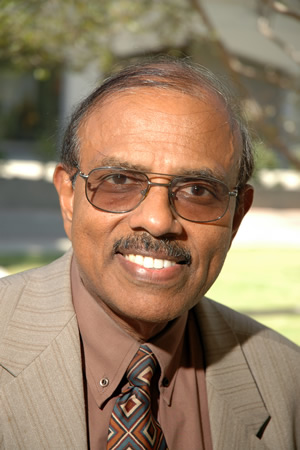Mentoring India
Engineering Dean Represents U.S. and the Washington Accord in India
April 28, 2009
By Russ L. Hudson

Raman Unnikrishnan
Raman Unnikrishnan, dean of the College of Engineering and Computer Science, recently spent eight days in India on behalf of the international Washington Accord working with the All India Council for Technical Education and India's National Board of Accreditation. Unnikrishnan was there to guide India’s efforts to fulfill the terms of membership set by the Washington Accord to which India, with more than 3,000 technical and applied-science universities, gained provisional status in 2007.
The accord, initiated in 1989, is an international agreement among bodies responsible for accrediting engineering and technical degree programs in their countries. Members include the U.S., Australia, Canada, Chinese Taipei (Taiwan), Hong Kong China, Ireland, Japan, South Korea, New Zealand, Singapore, South Africa and the United Kingdom. India, Germany, Malaysia, Russia and Sri Lanka hold provisional status.
Full membership in the accord provides engineering and technical graduates the ability to practice in any other member’s country without the time-consuming process needed to prove their competence in each one. Each accord member recognizes the equivalence of the other accord members’ training programs.
“With the accord,” said Unnikrishnan, “it is not just the technology learned that counts."
"In the U.S., we believe in assessing whether the engineering graduate has actually acquired the requisite attributes in technical knowledge, ethics and best practices. We do not take anything on faith value. That is the ‘outcomes’ approach, which the accord requires.”
Technology is already mobile, even if universal recognition of degrees isn’t, Unnikrishnan said. “An American company can be operating in, say, Australia, with a workforce drawn from the U.S., China and India. All of these engineers need to understand the culture of the company, the needs of the customer and the laws and ethics of the land. The most important nontechnical attribute for an engineer today is the ability to adapt.”
Engineering and technical education have become mobile, too, he said. His own college’s students and faculty include citizens of nearly 70 countries, some enjoying dual U.S. citizenship as well. “Even our professional journals have an international outlook, and professional societies have international chapters to bridge boundaries,” the dean pointed out.
Unnikrishnan’s report cannot yet be made public, but there are some observations he can share. "Two of India’s strengths are the culture of parental support for children’s education and the already established international success of Indian engineers. I also saw inconsistencies not only between India’s and other countries’ terminology, but inconsistencies within India, as well. That kind of thing causes confusion and confusion can cause errors.”
Unnikrishnan spent the first few days of his February visit at PSG College of Technology in Coimbatore in southern India to observe an accreditation visit by the NBA.
“His visit was very valuable for us. He had some excellent observations to make,” said G. Rangaswamy, managing trustee of PSG and Sons’ Group of Institutions that includes the college. Rangaswamy has since opened discussions with Unnikrishnan on the possibility of joint research projects between the two universities.
Later, in his presentation to the AICTE and NBA in New Delhi, Unnikrishnan received a strong response. “The interest and enthusiasm was tremendous,” the dean said. “When I spoke to them, a presentation that was to take 30 minutes took four hours because of all the discussion.”
The accord chose Unnikrishnan as a mentor to India based on his extensive experience with accreditation. He has evaluated engineering and computer science programs in Mexico, Turkey, Saudi Arabia, Qatar and, in the United Arab Emirates, Sharjah, Dubai, Ras al-Khaimah and Abu Dhabi on behalf of ABET, Inc. (until recently known as the Accreditation Board for Engineering and Technology).
In July 2008, after 12 years as an evaluator, ABET appointed the dean to its national Engineering Accreditation Commission, and the commission recommended the accord appoint him mentoring representative to India.
Before coming to Cal State Fullerton in 2001 to head ECS, Unnikrishnan spent 10 years as head of the Rochester Institute of Technology Department of Electrical Engineering in New York. There his numerous awards included the Rochester Institute Eisenhart Award for Outstanding Teaching, the University of Missouri Honor Award for Distinguished Service in Engineering and Xerox Corp.’s Professional Excellence Award. in 2008, he was named an Institute of Electrical and Electronics Engineers Fellow, an honor bestowed on less than 1 percent of IEEE members internationally. The fellowship is based on a member’s contributions to engineering and engineering education.
Earlier this year, Unnikrishnan received the Distinguished Engineer Award, the highest award South Dakota State University College of Engineering can give to its alumni. Previous honorees include Stephen F. Briggs, founder of Briggs & Stratton Engine Co. and Gene M. Amdahl, founder of Amdahl Corporation.
Unnikrishnan received his doctorate from the University of Missouri, Columbia, his master’s from South Dakota State University and his bachelor’s from the University of Kerala, India — all in electrical engineering.

